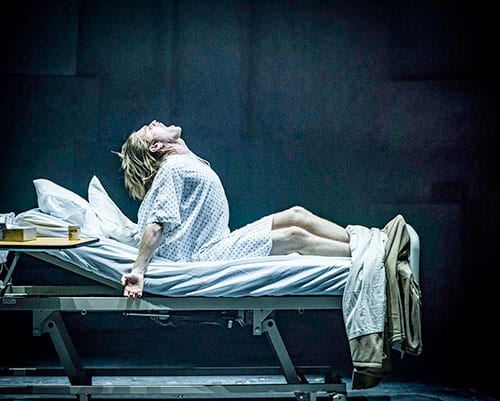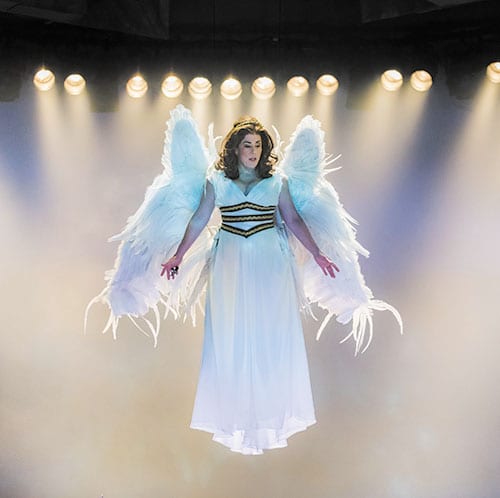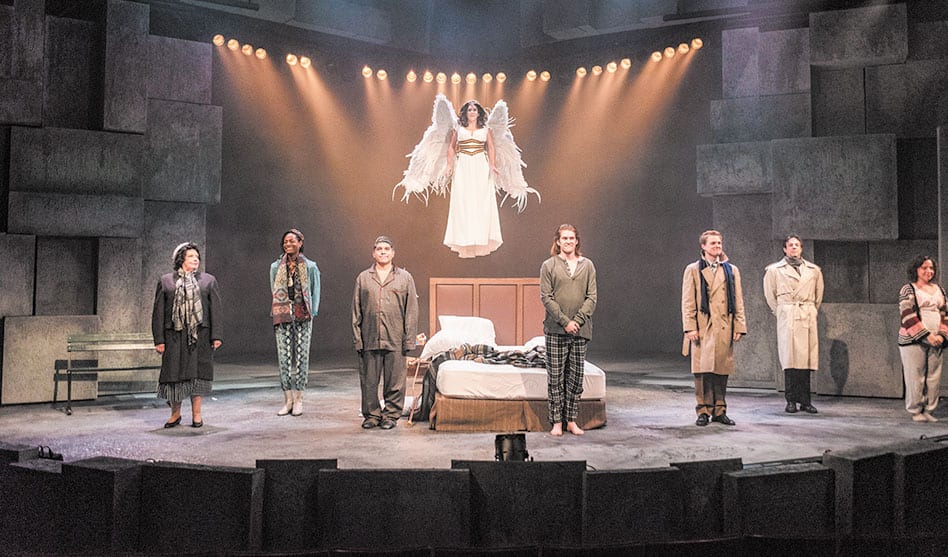Uptown Players will finally stage the seldom-performed second part to the epic ‘Angels in America.’
We sat down with the cast to discuss revisiting the material in today’s frightening political climate
ARNOLD WAYNE JONES | Executive Editor
jones@dallasvoice.com
 It is a muggy autumn evening, a few weeks before a contentious national election, and eight actors — Marianne Galloway, Pam Dougherty, Garret Storms, David Lugo, David Meglino, Kyle Igneczi, Walter Lee and Emily Scott Banks — have gathered in a rehearsal space inside the Kalita Humphreys Theater to begin working on a play that resonates as much today as it did when written in the early 1990s. The play, by Tony Kushner and set during the Reagan Era of the 1980s, is about fascism and AIDS and politics and, in a roundabout way, faith… not just in a Creator, but in America itself.
It is a muggy autumn evening, a few weeks before a contentious national election, and eight actors — Marianne Galloway, Pam Dougherty, Garret Storms, David Lugo, David Meglino, Kyle Igneczi, Walter Lee and Emily Scott Banks — have gathered in a rehearsal space inside the Kalita Humphreys Theater to begin working on a play that resonates as much today as it did when written in the early 1990s. The play, by Tony Kushner and set during the Reagan Era of the 1980s, is about fascism and AIDS and politics and, in a roundabout way, faith… not just in a Creator, but in America itself.
We are talking, of course, about Angels in America. And the year is 2016.
But also 2018.
Go figure.
Because Uptown Players — which brought Kushner’s seminal, two-part epic, subtitled “A Gay Fantasia on National Themes” back to the Kalita for the first time since the Dallas Theater Center’s controversial production in the late 1990s — has finally gotten around, after two years, to completing its cycle. And what a difference a couple of years can make.
When Part One: Millennium Approaches opened in 2016, America was on the brink of electing its first female president, of continuing the empowering transformation of American political life, of passing the torch of the chief executive of the country from a black man to a white woman. Only that didn’t happen, midway through the run, the unthinkable happened. President Cheeto shuffled his tacky band of self-interested neophytes into the halls of power.
The development — just the election, mind you; the shitstorm of tweets, scandals and tell-alls was still months from starting — changed the pallor of those remaining performances. Now, with 23 months of hindsight, they have begun the process of reconnecting with their characters (the entire main creative team, including director Cheryl Denson, producers Jeff Rane and Craig Lynch and all the designers are back) in Part Two: Perestroika. Part One — with its wide-winged angels crashing through the ceiling in a fury of Old Testament bombast to end the play — is the better known of the show, the more often produced; doing them in repertory, as they did on Broadway last season, is a rare sight. And possibly one that would have proven too taxing even for this cast.
We sat around with all eight, just as rehearsals for Perestroika were starting, to get their insights into coming together to do Part Two together in the age of Trump.
Dallas Voice: What was it like, that first time you got together to rehearse Part Two after nearly two years ago? Pam Dougherty: Everyone one of us was 30 minutes early. We all hugged.
Kyle Igneczi: It has been surreal. For the last two years, we have seen each other in the lobbies of other theaters and said, ‘Is this happening? Are we doing this thing?’ And yesterday we said how lucky that is that we could be here.
Emily Scott Banks: When we saw each other in the parking lot it was super-exciting. It feels real. We would message each other and ask ‘Have you heard anything?’ There was much of that angst!
PD: I thought I was the only one with angst!
David Lugo: We all turned down other work — paying jobs and longer runs than this — to be here.
Marianne, it’s double-deja-vu for you. About a decade ago, you did Part One as a director [with Emily also as the Angel] at the Bath House with with Risk Theatre Initiative, but didn’t get to do Part Two. Marianne Galloway: We were supposed to do Part Two with the original cast coming back, but that was around the same time Risk was shuttering and I went to the cast and said ‘We can’t do it.’ So we all went to my living room and read through it and it was like a little funeral for the dream. And so I was like Perestroika just doesn’t happen.
 What was it like during the production of Part One when, midway through, Trump was elected? How did it impact those remaining performances? ESB: I have very clear memories of the Tuesday/Wednesday/Thursday of that week. We were in a national depression [over the election of Trump]. And when we [went back to perform the first Thursday performance], every line that was said I was like “Fuuuuccckkkk.” The play took on so much more depth and power and prescience; it was so frighteningly true. The whole Roy Cohn/Trump thing.
What was it like during the production of Part One when, midway through, Trump was elected? How did it impact those remaining performances? ESB: I have very clear memories of the Tuesday/Wednesday/Thursday of that week. We were in a national depression [over the election of Trump]. And when we [went back to perform the first Thursday performance], every line that was said I was like “Fuuuuccckkkk.” The play took on so much more depth and power and prescience; it was so frighteningly true. The whole Roy Cohn/Trump thing.
MG: I thought, how am I supposed to go out in front of these audiences and say these lines on this day. Go out there because you’re supposed to do this now.
ESB: It was amazing. It was a different reaction. They laughed more but there was that potent silence that was so charged. The audience was very engaged.
David Meglino: Their ears were tuned into the political content more.
DL: When we started rehearsing and opened the show, we looked at it as something that happened, after [the election] we looked at it as something that could happen again; now it feels like it is happening over.
KI: When the first one happened, we were all in a very hopeful spirit. So we entered into it with this hope where the outcome was better. But now we are coming into it with bleak outlook on real life and trying to tell the most hopeful end we can.
Garret Storms: I wish I had this one to balance myself off of [back then]. Both plays ground each other. It would have been a different thing to do this then [instead of now]. Allowing the world to be present in our storytelling. Spectacular, wonderful miraculous things happen in this play and we need to allow those things to be present [despite] the ugliness happening [in the world right now].
It’s reductionist to call particular characters villains, but I think obviously Roy Cohn is the real-life villain of the piece, but Louis is also kind of a bad guy…. DL: You have to advocate the character completely. You have to do what Kushner says and what Roy actually did. He’s a real person and a suffering person. You have to play that whether the audience likes it or not. I loved playing this character. My dream role is Richard III. But this is the blessing — it’s so much better than Richard III.
DM: I was familiar with this play in high school and when I read it as a teenager I remember thinking Louis [who I play] was just a bad guy. When I reread it prior to this production I was an adult and had a journey similar to Louis’ and I realized what he did was really, really awful but really, really human. I had to say what if what he does is wrong, but I see it as so wrong I can approach his humanity? At one point I have to approach him as wrong but not completely fallible.
GS: The two [villains] are so self-aware. Louis knows he’s being awful.
KI: Kushner does a remarkable job of treating all the characters, including Roy, with such reverence.
DM: In the end Kushner looks at Roy and says he has a place in the cycle of violence and says, you’re a human being, too.
DL: He brings Roy back to Joe to say Love will take you places — don’t give up on love.
Is Kushner hard to perform? PD [resting her head with a sigh]: I’ve been working on my monologue for six months! But I don’t understand it! I hope the understanding comes before the show.
DL: Everyone has a speech where the integrity of prose is broken somehow. You just have to keep moving.
Part Two is more complicated than Part One. MG: Millennium Approaches is all exposition then you get to Perestroika and it’s all boom-boom-boom.
DM: He keeps rewriting Perestroika — we have discovered at least four versions.
DL: There’s a Roy Cohn monologue [in this version] that has never been produced.
 How are the plays different from each other? What is the “message” of Part Two? Walter Lee: I don’t think the message is forgiveness, but that’s a part of it. The characters patch up [their relationships]. They tolerate each other and find a happy medium.
How are the plays different from each other? What is the “message” of Part Two? Walter Lee: I don’t think the message is forgiveness, but that’s a part of it. The characters patch up [their relationships]. They tolerate each other and find a happy medium.
DM: There’s something about rebuilding. Prior finds his chosen family … All of these characters eventually come together and work out all the problems of this world.
GS: It’s a motley crew but a resilient one which mirrors the spirit of this country.
DM: There’s work to be done — we’ve identified the path, but the journey continues.
ESB: We have a chance to offer grace and move forward.













